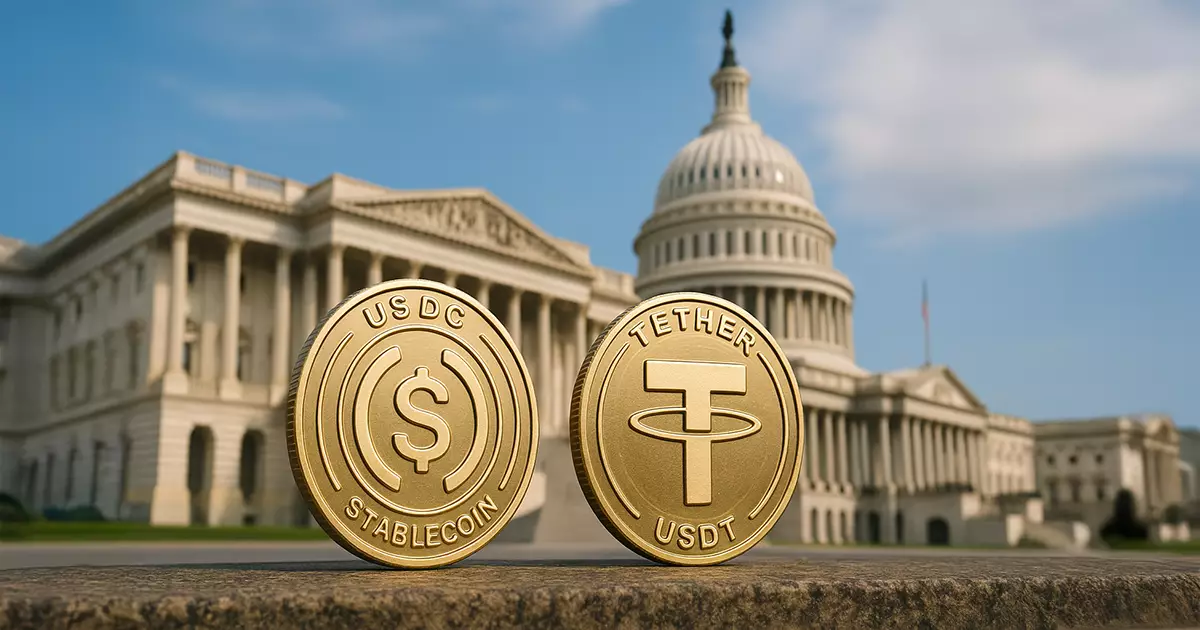The political landscape of stablecoin legislation in the U.S. just experienced a seismic shift. A collective statement from nine Democratic Senators has sent shockwaves through Washington, signaling a significant stall in the progression of the Guiding and Establishing National Innovation for U.S. Stablecoins (GENIUS) Act. This is not just a simple disagreement; it represents an imminent battle between progressive and more traditional financial sectors. The Senators, including notable names like Raphael Warnock and Catherine Cortez Masto, have made it clear that their support hinges on adjustments to a bill they believe is fundamentally flawed. This unprecedented move highlights a critical turning point for the fragile bipartisan consensus surrounding cryptocurrency regulation.
In today’s polarized climate, one might expect a purely partisan divide. Yet, the sight of Senators who previously supported the legislation now en masse signaling their disapproval illustrates the genuine concerns many have regarding the potential impact of stablecoins on both consumers and the financial ecosystem as a whole. They argue that without stronger provisions addressing anti-money laundering, foreign issuers, and national security, consumers are left catastrophically exposed. If these concerns are not adequately addressed, it raises troubling questions about the adequacy of our regulatory framework during a time of rapid technological change.
The Irony of Bipartisanship
Interestingly, while the genesis of the GENIUS Act aimed to be a cooperative, bipartisan initiative between Democrats and Republicans, its potential for success now relies on the very complexities that make the legislative process daunting. The original bipartisan measures now appear flimsy as these Democratic Senators withdraw their support, invoking the age-old adage that the devil is in the details. The necessity for robust and clarity-filled regulations is underscored by the increasing complexity of digital currencies—stablecoins included. The absence of proper regulations, they argue, could lead to financial breakdowns that echo the 2008 crisis.
One of the more alarming critiques came from Senator Elizabeth Warren, who cautioned that the GENIUS Act could inadvertently empower big tech companies in ways that threaten financial sovereignty. A legitimate concern, considering the increasing dominance of these conglomerates in various sectors. By linking financial innovations like stablecoins to larger corporate interests, the bill faces accusations of compromising consumer protection and potential bureaucratic accountability.
Community Voices and Banking Concerns
To add further layers to the debate, a coalition of 20 community banking organizations has stepped forward, mirroring the Senate’s concerns while amplifying their unique perspective. Their contention that the GENIUS Act could displace traditional deposits is especially poignant; such a development could result in economic destabilization. Community banks not only provide essential services to the local populace but also embody the stability that the financial system needs. The fear is palpable: a regulatory framework that favors large institutions risks alienating a vital segment of the financial landscape that serves as an economic lifeline for many Americans.
The contradiction stands glaringly clear. While the push for innovation in finance appears progressive, it simultaneously risks eroding the foundational structures that ensure equitable access to financial services. The legislative focus should expand to encompass dialogue around how these new currencies must be integrated thoughtfully into existing financial ecosystems rather than merely overlaying new structures atop fragile foundations.
The Path Forward: Reassessing Priorities
Meanwhile, the architecture of the GENIUS Act, which mandates stablecoins must be backed 1:1 by U.S. Dollars or insured assets, raises legitimate questions concerning the practicalities of enforcement and oversight. Would issuing entities be auditable? What are the real prosecutable consequences for non-compliance? As it stands, these ambiguities must be clarified if confidence in the legislation is to be restored. With a looming deadline for a Senate vote, the urgency for constructive dialogue has never been greater, yet the momentum appears to be sharply leaning toward impasse rather than cooperation.
Additionally, the significance of the Republican lead Senator Bill Hagerty’s remark emphasizing American leadership in digital assets cannot be overlooked. While the ambition to maintain U.S. competitiveness in the global digital economy is commendable, it cannot come at the expense of consumer protections or economic equity. Stakeholders must balance innovation with responsibility—a challenge that requires foresight, vigilance, and firm bipartisan commitment.
This multifaceted standoff surrounding the GENIUS Act symbolizes the broader tensions within American politics: the need for rapid innovation tempered by the necessity for consumer rights and financial stability. As we grapple with these complex issues, it begs the question: What does the future hold for Congress’s ability to coalesce behind a bill that upholds the integrity of our financial systems while embracing the digital revolution? Only time will tell how this pivotal moment unfolds.















Leave a Reply